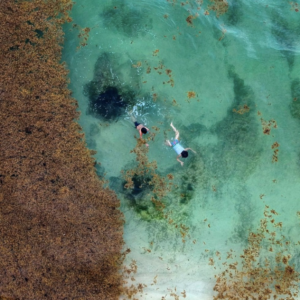© Good Travel Guide, March 2022
Author: Lucia Roldan
On this occasion, we will travel from Australia to Spain to discover three examples of environmental and climate action taken in the aftermath of the pandemic.
Townsville City, Australia

Let’s start with Townsville City, in Australia, an industrial city linked to mining and manufacturing, that had to face some stereotypes and challenges such as implementing environmental and sustainability projects that demonstrate real and significant effectiveness, as well as assessing the need for quick results and job creation due to Covid-19.
In order to achieve it, the Council’s Sustainability section teams quickly adapted to use the Qld Government’s Covid-19 grants in order to support the reef and launch a new environmental training program, along with new jobs and providing opportunities within the community that will translate into results for the reef.
And so the Townsville Reef Assist program was born. The main actions were: official training in environmental management, seed collection and raising, business growth and resilience training, and teaching how to convert weeds to a high-value soil product while providing significant ecosystem restoration due to removal of invasive species. Also, we could highlight the certificates in machinery operations, the development of eco trails, and building of seats and other small infrastructure for the eco trails.
Creating a collaborative framework with businesses to develop new environmental capacity in Townsville was a key outcome for the City Council. The teams worked in different areas, but collaborated to share and pass on knowledge when faced with challenges and were able to share resources and step outside their areas to support other teams when needed, which is quite unique.
In this way, they were able to:
- Identify and Construct 5 key walking trails;
- Convert 250 tonnes of weeds and soil into high-value humification products;
- Collect log and store 5000 native seeds for rehabilitation works;
- Plant or foster 5000 local native plants in key ecological areas.
The innovative systems and processes developed during the Reef Assist program and the ability to pivot as needed have been one of the keys to informing and then supporting Council’s new direction with the 2021-26 Corporate Plan.
Collaboration has been key to the success of this initiative. And, furthermore, the connection between business and local government, while providing business and training opportunities, always leads to better outcomes for all parties.
Augusta Margaret River, Australia

We will now talk about the Shire of Augusta Margaret River, an ecologically and geologically unique region located in the South West of Western Australia.
Its local community has always identified the natural environment as a key value, making it a very important part of its collective identity. Therefore, residents have always been very concerned about climate change and its consequences.
In 2019, the Augusta Margaret River Shire Council voted in support of a Climate Action Summit. This summit aimed to create a community-led response to reducing carbon emissions to net-zero by 2030 that would set the foundations for the Shire’s inaugural Climate Action Plan. Most impressive compared to other initiatives is that the plan had to be developed by the community, for the community.
This is the premise that indicated that there would be something that would set it apart from other environmental plans, events, or summits. This created the sense of a community-led and accessible initiative, rather than a bureaucratic local government project, and encouraged high community participation. Over the course of three months, workshops, forums, community surveys, and a youth summit at the local high school were held to consult with a cross-section of the community and gather their ideas for projects to reduce emissions.
All of these efforts ultimately led to the Climate Action Augusta Margaret River Summit in May 2020 and was hosted by the World Surf League, thereby raising the profile of the summit internationally. Actually, since the event took place, the World Surf League has announced that all of their events will be carbon neutral and plastic-free.
But the biggest result of the summit was the list of priority actions, voted by attendees from the consolidated list of community suggestions, such as: Supporting the agricultural transition to more sustainable practice, developing and promoting programs to think local, buy local, swap, share, and exchange; developing a community renewable energy power-sharing system; supporting the transition to electric vehicles; or providing low carbon public tourist and school transport; among others, most of which are being implemented and monitored.
Thanks to the success of the project the Shire’s working on implementing the Climate Action Plan, which has also increased the community awareness and ownership regarding climate change action, and it is also noteworthy that since the Summit, the Shire of Augusta Margaret River has declared a Climate Emergency.
Menorca Biosphere Reserve

We now move to Menorca, a magical island located by the Mediterranean Sea, where quality, design, nature, and tradition come together in a commitment to conservation and proximity through a Sustainable Tourism Plan launched at the end of 2020 and currently running until the end of 2023.
The plan is aligned with the Biosphere Reserve Action Plan 2019-2025 which is developed within the framework of the 17 Sustainable Development Goals (SDGs) of UNESCO’s 2030 Agenda.
In addition, the different projects and transformations being carried out on the island of Menorca cover both socioeconomic and environmental objectives. By supporting sustainable business entrepreneurs and local tourism employment, increasing mobility through routes that connect the beaches and coastline with the urban center, or improving the quality of life of residents and contributing to gender equality.
But also trying to mitigate climate change by promoting the transition from the use of vehicles such as rental cars or motorcycles to other non-polluting means of transport such as bicycles, walking routes, kayaking, etc.; enhancing the rural and coastal landscape, as well as the agroforestry biodiversity of Menorca as a strong point of tourism. Thus, the incorporation of sustainability in the value chain will be very valuable, not only for tourism but for any product or mobility activity, elevating it to the fundamental axis of the management of all types of activities.
These ongoing works and investments are being complemented by an ambitious training plan for the tourism sector on sustainability and how to transform tourism activities and reduce greenhouse gases emission and raise awareness about the authentic Menorca, so that people appreciate and care for it.
The ultimate goal of Menorca will be to become a sustainable island in all senses and activities that take place in it.
From these three destinations, we should highlight that while the success stories show admirable and, more importantly, replicable results for other cities on environmental issues, they all have strong local involvement, a common element that seems key to achieving their goals.
See you in the next Environment and Climate Action article thanks to other super Green Destinations!




